South Africa, hosts of the African Cup of Nations, longs for a hero to emerge from this tournament. In truth, the country's most popular sport is short of them.
Today, against Morocco in Durban, South Africa seek a place in the tournament's quarter-finals for the first time in over a decade.
Their likeliest hero is not in the country. Steven Pienaar, the former captain, retired from national duty last October, eager to maintain his excellent form with Everton in the English Premier League without the potential six-week interruption of a Nations Cup.
Who picks up the baton? Judging by the profile he holds across the country's advertising space, and the winger Siphiwe Tshabalala should have been the man.
Tshabalala, with his long braids and the happy memory of the fabulous, long-range goal he scored against Mexico to open up the 2010 World Cup, smiles down from billboards promoting fast food, and features in television slots retailing men's grooming products.
He is a star at the most popular club, Kaizer Chiefs. But midway through the second half of South Africa's drab draw with Cape Verde eight days ago, Tshabalala was booed off the field when he was substituted.
South Africa made wholesale changes for their second Group A match, against Angola. No Tshabalala, and a new look midfield and forward line. By the end of the 2-0 win, Pienaar, watching from Liverpool, England, had no doubt about the hero: "Dean Furman was the best player for us," Pienaar said of the 24 year old making his tournament debut.
Furman, in the centre of midfield, played tidily and with authority, his passing crisp, his seventh cap for his country a resounding success.
This is not a footballer with the glamour of a Tshabalala. He has nothing like the status of Pienaar. His club, Oldham Athletic, are in English football's League One, two tiers below the Premier League.
Oldham might have given their captain, Furman, one of the biggest days of his low-key career today. They meet Liverpool in the FA Cup.
South Africa, as he tells it, have given him something even more special. The victory against Angola, he told reporters, "was incredible. To play in front of a home crowd of 50,000-odd fans, to hear the noise they generate, to hear the singing, it was a joy. We're delighted we gave them three points to celebrate."
Something else, besides his accomplished showing, has made Furman stand out. He is white.
South Africa, even 20 years after the country dismantled apartheid, the political system of privilege and deprivation based on colour, is self-conscious about race, and although the headline on the back page of The Sowetan newspaper on Friday was clearly affectionate in referring to Bafana Bafana's "token mlungu" - mlungu means "white person" in Zulu - the fact that Furman comes from a distinct social background to most of his national colleagues has attracted attention.
When South Africa won the Nations Cup in 1996, less than two years after the country's first democratic elections swept Nelson Mandela to the presidency, the demographic of the team became a welcome symbol of the so-called "Rainbow Nation". Their captain, Neil Tovey, was white.
Their best player, Lucas Radebe, was black; the scorer of the two goals in the final that clinched the trophy was Mark Williams, from the so-called "coloured" - mixed-race - community.
In the current team, Furman is a novelty. According to the Johannesburg Times, there exists a knot of prejudice against the national sport within the country's largely upper or middle-class white society. It wrote of "the scorn with which football is held by the rich schools that most white kids attend. If they spend anything at all on football, it's a fraction of the money they spend on rugby and cricket".
It also suggested "some white parents don't want their kids to participate in a majority-black sport."
Furman may yet do his little bit to alter that.
Follow us


